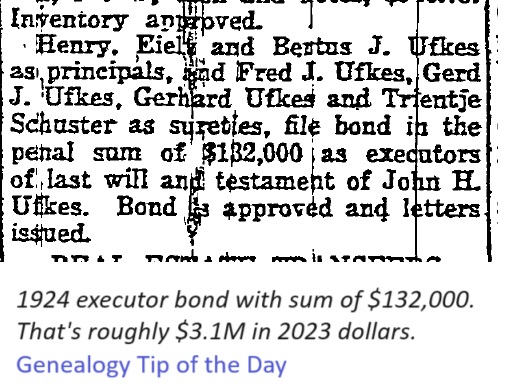
Executors of an estate can be asked to post a bond. The value stated on the bond is related to the perceived inventoried value of the estate. Typically the bondsmen (or sureties) need to be of sufficient financial means to cover the value of the bond in case the executors mismanage the estate. If the executors execute their duties as they are supposed to, there is no problem for the bondsmen (or sureties). But if they do not, the court will come after them to cover the cost. Bondsmen (or sureties) for executors should trust the executors to do as instructed. If the executors do, the bondsmen are not out any cash or property.
There were four bondsmen for the three executors of the John Ufkes estate in 1924. The stated value of the bond was $132,000. They were all siblings–three men and one woman. The judge would not just appoint any one as bondsmen–they should be able to cover the value of the bond if necessary. It’s very possible that all four–including the sister–were needed. Women could be bondsmen–they just had to have property. Trientje was widowed at the time and, like her brothers Gerd and Gerhard, owned real estate in her own right. Owning real estate was not sufficient in itself, debt on the property would be included.
Always take a look at the bondsmen on executor or administrator bonds. The bondsmen are trusting that the executor or administrator will perform his duties faithfully and that they won’t actually be required to “cough up” the cash value stated on the bond. The judge also is not going to approve of bondsmen who he knows would not be able to cover the value of the bond on the chance it is needed.








No responses yet